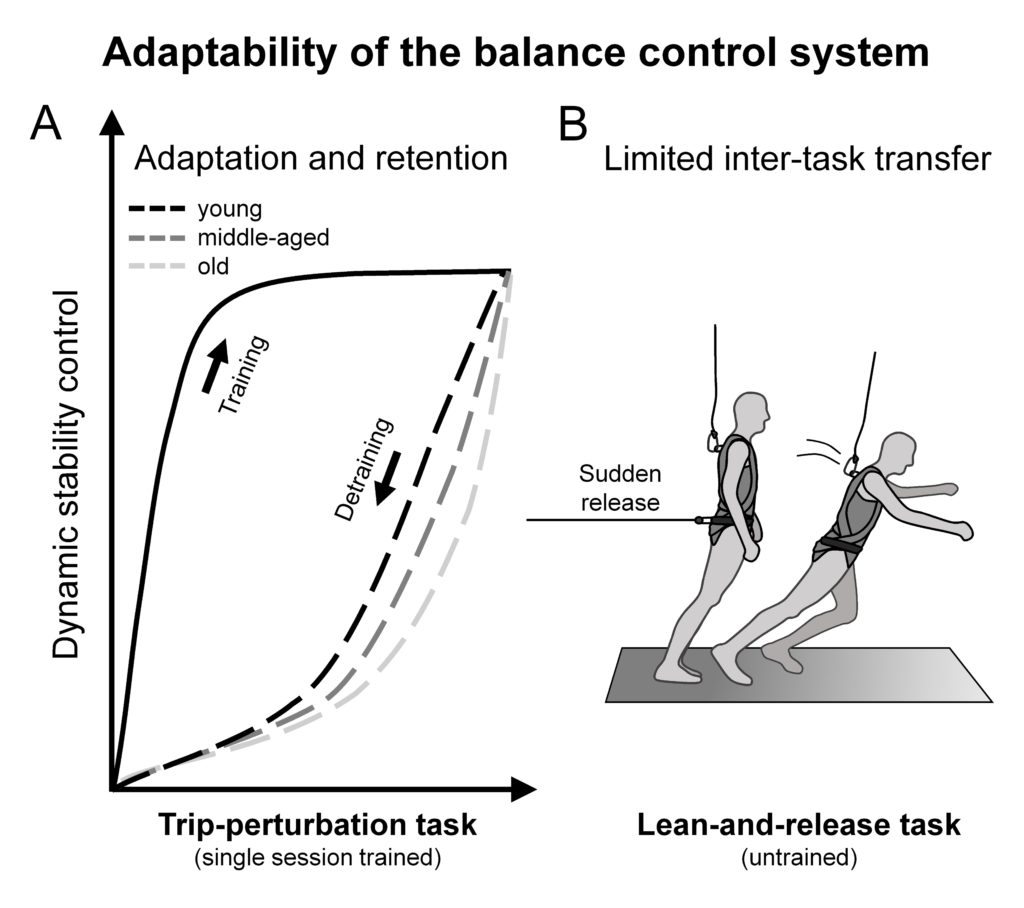By Matthias König
Daily-life locomotion constantly challenges us to respond to sudden disturbances and changing environments. To improve such ‘fall-resisting skills’ in older adults, previous studies applied repeated trips or slips in the laboratory and demonstrated remarkable training effects, which could be partially retained for well over 1 year. Tailored recommendations for these falls prevention interventions require knowledge on the dynamics of learning and forgetting in groups of different age or performance capacities. It is also important to establish whether these learning effects can transfer between different tasks, considering that real-life falls can result from a variety of postural threats. We examined adaptation of recovery from gait perturbation, its retention over time and generalizability beyond the trained task across the adult lifespan.
To achieve this, young, middle-aged and older adults experienced eight unexpected trip-perturbations (i.e. an ankle suddenly pulled by a break-and-release system) while treadmill walking. A single trip-perturbation was repeated after 14 weeks to examine the retention of training effects. Secondary, before and after treadmill walking, all participants were exposed to an untrained lean-and-release transfer task (Figure B). For both tasks we used the margin of stability to quantify stability of the body during the first step after perturbation. All age groups rapidly improved their reactive response to a similar extent when exposed to repeated trip-perturbations and showed retention of learning effects after 14 weeks without training. We did, however, find an age-related decrease in the ability to retain learning effects. Furthermore, despite such robust adaptations to the balance control system, improvements to the untrained transfer task were not superior to those of age-matched control groups who did not undergo the trip-perturbation training.
Our results demonstrate that the ability to adapt to repeated exposure to balance-challenging perturbations remains highly effective up to old age, but the ability to retain acquired skills appears to be diminished as age increases (Figure A). In addition, these learning effects from one type of perturbation training do not seem to necessarily transfer to a different perturbation task (Figure B). Hence, although single perturbation training sessions show large learning effects, more regular sessions may be needed for middle-aged and older adults to counteract the greater decay in training effects. It remains to be seen whether there are specific neuronal factors promoting or limiting adaptability (i.e. adaptation, retention and transfer) of the ageing balance control system.

Figure: Schematic illustration of the adaptability of the human balance control system to trip-perturbation training. While rapid learning to perturbation training may be preserved, the ability to retain acquired skills seems diminished with increasing age (A). We found no evidence for transfer of training effects to an untrained reactive balance task (B). Adapted from König et al. (2019). Copyright © 2019 the American Physiological Society. Used with permission.
Publication
König M, Epro G, Seeley J, Potthast W, Karamanidis K (2019). Retention and generalizability of balance recovery response adaptations from trip perturbations across the adult life span. Journal of Neurophysiology, 122(5):1884-93. https://doi.org/10.1152/jn.00380.2019
About the Author

Matthias König
Sport and Exercise Science Research Centre, School of Applied Sciences, London South Bank University, London, United Kingdom
Matthias is a PhD candidate in Biomechanics at London South Bank University in collaboration with the German Social Accident Insurance. His core research centres around the adaptability of gait stability control to reactive balance training across the adult lifespan, with a special focus on memory and generalizability of fall-resisting skills.
Copyright
© 2020 by the author. Except as otherwise noted, the ISPGR blog, including its text and figures, is licensed under a Creative Commons Attribution-ShareAlike 4.0 International License. To view a copy of this license, visit https://creativecommons.org/licenses/by-sa/4.0/legalcode.
ISPGR blog (ISSN 2561-4703)
Are you interested in writing a blog post for the ISPGR website? If so, please email the ISGPR Secretariat with the following information:
- First and Last Name
- Institution/Affiliation
- Paper you will be referencing


